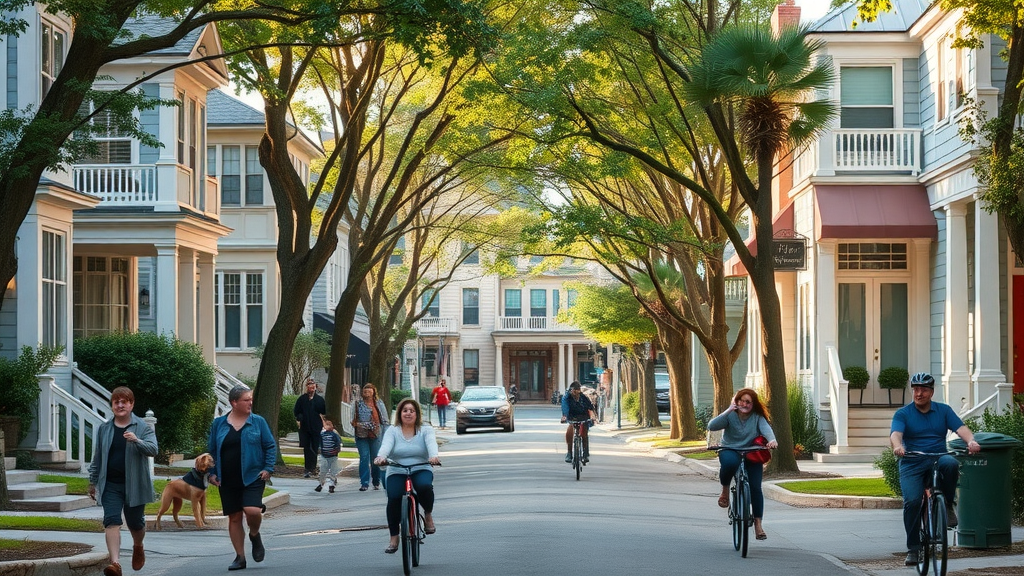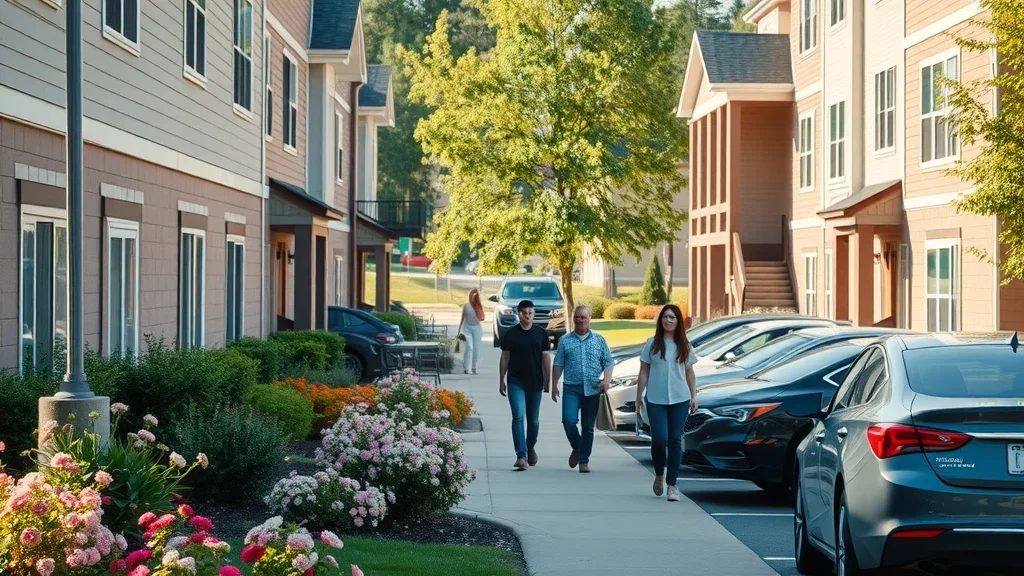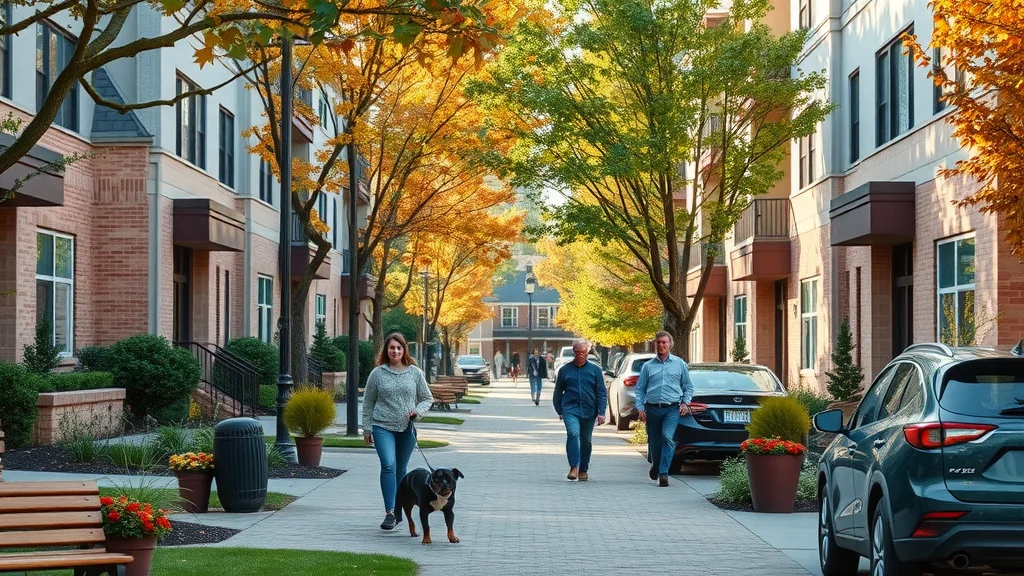Did you know that Charlotte’s average rent skyrocketed by over 15% in the last two years—outpacing almost every major U.S. city? If you’re curious what this means for current and future renters, you’re not alone. The Charlotte NC rental market is full of surprises, but knowing the facts will give you a serious edge—whether you’re seeking your first apartment, considering an upgrade, or just keeping tabs for the future. With demand, prices, and neighborhood personalities all in flux, this article offers fresh perspectives and actionable insights to help you make savvy rental decisions and stay ahead of the competition.
Charlotte NC Rental Market: Surprising Stats and Fresh Perspectives
- Startling fact: Charlotte's average rent increased by over 15% in the past two years, outpacing most U.S. cities. This makes it one of the most dynamic rental markets in the South, bucking trends found in other metropolitan areas.
- Many expected Charlotte’s cost of living to hold steady as newcomers poured in, but the city’s thriving job sector and influx of tech companies have driven rent prices higher than anticipated. This rapid rent growth directly impacts both new and long-term residents, reshaping where people live and what they can afford.
- As many renters adapt to higher monthly costs, property types from compact studios to luxury condos are in demand, and even suburban areas—once overlooked—are experiencing significant rent increases. Making informed choices now is more important than ever, whether you’re searching for a new place or renewing your lease.

Key Takeaways: Charlotte NC Rental Market Insights
- Current average rent in Charlotte is rising, with considerable variance by neighborhood and property type.
- Top neighborhoods to watch include South End, NoDa, and Plaza Midwood , each bringing unique appeal to renters.
- Forecasted rent prices suggest continued growth—stay tuned for what this means for affordability and your next lease.
- Experts highlight a shift in supply and demand, driven by demographics, new construction, and Charlotte’s local economy.
Decoding Average Rent in Charlotte: Where Prices Stand Now
Average Rent and Median Rent Breakdown in the Charlotte NC Rental Market
- As of early 2024, the average rent for an apartment in Charlotte sits around $1,630 per month —with one-bedroom units averaging $1,420, two-bedrooms edging close to $1,700, and studios fluctuating near $1,250. The median rent is just slightly below, indicating a relatively balanced distribution of rental prices across property types.
- Neighborhoods in Charlotte play a big role in determining rent price. For example, South End consistently outpaces the city-wide average, while emerging areas like East Charlotte and Plaza Midwood offer a mix of moderate to premium pricing. This disparity is growing, especially as more renters prioritize location, amenities, and proximity to tech hubs.
- Over the past twelve months, Charlotte’s rental market has seen year-over-year price increases exceeding 8% . Although some seasonal slowdowns occur, the general trend remains upward, spurred by population growth and new developments vying for renters’ attention.
| Neighborhood | Studio | 1-Bed | 2-Bed | 3-Bed |
|---|---|---|---|---|
| South End | $1,500 | $1,700 | $2,100 | $2,600 |
| NoDa | $1,340 | $1,520 | $1,880 | $2,400 |
| Plaza Midwood | $1,270 | $1,405 | $1,740 | $2,200 |
| East Charlotte | $1,090 | $1,215 | $1,510 | $1,850 |
| Myers Park | $1,850 | $2,150 | $2,870 | $3,330 |
"Charlotte’s rental market has shifted dramatically due to migration trends and local economic growth." – Local Housing Economist

Rent in Charlotte: Exploring the Neighborhoods in Charlotte NC Rental Market
Popular Neighborhoods and Their Impact on Average Rent in Charlotte
- South End and NoDa stand out as magnets for young professionals, thanks to their vibrant arts scenes, walkable streets, and proximity to uptown tech campuses. Here, amenities like rooftop lounges and coworking spaces justify higher rent prices, making these areas trendsetters in Charlotte's rental market.
- Plaza Midwood is embracing a rapid transformation—new restaurants, small businesses, and a community-driven vibe make it one of the most popular neighborhoods for newcomers. As more relocate to take advantage of Charlotte’s job market, rents in this sector steadily move upwards, reflecting renewed demand.
- Nearby universities and the city’s technology corridor drive substantial activity in the rental market. Access to public transit and key employment centers cause neighborhoods in Charlotte—especially those close to business districts—to command premiums well above the city's average rent.
Affordable Neighborhoods in Charlotte’s Rental Market
- For budget-conscious renters, East Charlotte and parts of St. Charlotte remain hidden gems. These areas offer affordable rent prices while boasting established communities, diverse dining, and access to highly-rated schools. Many residents highlight the cost of living as “lower than the national average,” helping them stretch every dollar.
- Community-driven affordable neighborhoods in charlotte nc rental market, including select corners of University City and West Charlotte , feature historic homes, green spaces, and family-friendly amenities. These properties tend to fill quickly—especially as demand for affordable living outpaces available inventory each year.
Most Expensive Neighborhoods in Charlotte and Their Rental Market Dynamics
- SouthPark and Myers Park typify luxury living in Charlotte. Here, renters pay a premium for spacious units, designer amenities, and quick access to upscale shopping or fine dining. Rent prices in charlotte for these neighborhoods can exceed $2,500 a month for standard two-bedroom apartments, and competition for listings can be fierce.
- What’s driving high rent prices in charlotte’s luxury segments? A combination of limited inventory, high demand from relocating executives, and restrictive zoning laws that slow new apartment construction. As a result, the lines between “expensive neighborhoods in charlotte” and the broader market are blurring as rents rise across the city.

Analyzing the Cost of Living and Rent Prices in Charlotte NC Rental Market
How The Cost of Living Compares to Rent Prices in Charlotte
- While average rent in charlotte remains lower than the national average in some segments, the total cost of living includes utilities, transportation, and other essentials that tip the scales. In popular neighborhoods and newer apartment buildings, monthly utilities can add $150–$200 to the bill, and transportation costs spike for commuters seeking more affordable properties further out.
- For many renters, relocating to nearby suburbs is becoming more attractive. With rising rent prices in charlotte and urban sprawl, moving to Huntersville, Matthews, or even Gastonia can significantly lower the total monthly outlay—despite longer commute times. Suburban life brings advantages like larger living spaces and greater access to parks and schools.
"Rising rent prices in Charlotte are pushing long-term residents to reconsider their lifestyle choices." – Urban Planning Professional
Charlotte NC Rental Market: Rent Price Drivers and Trends to Watch
Factors Influencing Rent Prices in Charlotte Rental Market
- Strong job market growth—especially in the tech, banking, and health sectors—continues to draw new residents and drive demand for rental units. As more high-earning transplants seek homes, rent prices in charlotte respond accordingly, setting new highs even in traditionally “affordable neighborhoods.”
- Population influx, fueled by demographic shifts (millennials and remote workers alike), is reshaping the rental market. This surge puts pressure on developers and policy makers to keep up with housing needs and manage rapid urban expansion.
- Local zoning laws, limited land availability, and the pace of new apartment construction together determine the rental market’s stability. In boom neighborhoods, late-arriving inventory is often snapped up fast, contributing to price volatility and stiff competition among renters.
Expert Opinions on the Rental Market in Charlotte NC
- Real estate agents and property managers acknowledge that while Charlotte rent has risen swiftly, the city’s relative affordability and lifestyle amenities are still a draw for out-of-state movers. Some note, however, that competition is intensifying for both premiere and mid-tier properties.
- Landlords are beginning to adjust their strategies—offering incentives or flexible leases—in response to evolving market conditions and more informed renters. Knowledgeable renters have more leverage than ever if they’re willing to shop around, negotiate, and stay flexible.

Are Rent Prices in Charlotte NC Going Down?
- Recent data trends in the charlotte nc rental market show that while the explosive growth has slowed, the majority of new listings remain priced well above pre-2021 levels. As more housing inventory enters the market, short-term stabilization is possible, but higher-than-average rent prices may persist as demand stays strong.
- New apartment construction and an uptick in available units are slowly filtering up the rental ladder, giving some renters a bit more bargaining power. However, most analysts predict that rent in charlotte will only experience modest dips unless there’s a significant shift in economic trends or migration patterns.
"We anticipate stabilization in rent prices for the first time in three years as inventory catches up with demand." – Regional Housing Analyst
- Watch a dynamic visual overview of Charlotte’s rental market, featuring graphics on average rent in charlotte, breakdowns of the hottest neighborhoods, and commentary from real estate professionals for context and strategies.
The Rent Forecast: What’s Next for the Charlotte NC Rental Market?
- Analysts predict that rent prices in Charlotte will continue to climb, albeit at a slower rate, over the next 12–18 months. Minor dips could occur as more apartments open, but long-term outlooks favor steady price growth tied to the city’s robust economy.
- Emerging neighborhoods such as West Charlotte and pockets of East Charlotte are poised for rent increases as developments finish and demand rises, giving savvy renters opportunities for value.
- Charlotte’s economy, led by banking and tech, will remain a catalyst for rental market change. Economic uncertainty or slowdowns could bring temporary relief, but expectations should be set for ongoing price competition among renters.
Is Charlotte NC a Buyers or Sellers Market? Rental Market Implications
- The tight housing inventory in Charlotte leans toward a seller’s market in real estate, keeping many would-be buyers in the rental pool. When homes are scarce, demand for rentals increases, leading to higher rent prices in charlotte and less turnover in desirable neighborhoods.
- When homebuyer activity surges—whether due to low interest rates or new incentives—it can temporarily shift rental market supply and demand. Currently, upward price pressure will likely persist until more housing is built or macroeconomic factors shift.

What Are the Biggest Issues Facing the Charlotte NC Rental Market?
- Affordability and gentrification pressures remain major challenges. As desirable neighborhoods redevelop and average rent rises, existing residents may be forced out, and housing becomes less attainable for many families.
- Tenant protections and landlord regulations are in constant debate. While some policies seek to stabilize rent prices and offer more security for renters, others may restrict investor interest or limit new construction, further fueling market instability.
- Urban sprawl—Charlotte’s rapid outward growth—complicates long-term rental market stability. Infrastructure improvements and sustainable planning are crucial to maintaining accessibility and affordability for everyone.
Frequently Asked Questions About the Charlotte NC Rental Market
- What is the current average rent in Charlotte? The current average rent in Charlotte is $1,630 per month, but this varies by property type and neighborhood. Studios and older apartments may fall below this figure, while premium or centrally located units can stretch well above the citywide average.
- Which neighborhoods are the most affordable? East Charlotte, parts of St. Charlotte, and select areas in University City and West Charlotte are known for below-average rent prices. These affordable neighborhoods fill fast, especially as more people move to the city seeking value.
- How does Charlotte compare to other major U.S. cities? While Charlotte remains more affordable than large cities like New York, San Francisco, or Austin, its rent prices are rising quickly relative to the national average. Compared to regional competitors, Charlotte offers robust job opportunities and lifestyle amenities, but affordability is becoming a challenging issue.
- Hear directly from renters and landlords as they share experiences navigating rising rents, exploring new neighborhoods, and balancing affordability with amenities in Charlotte’s competitive rental market.
Insider List: Tips for Navigating Charlotte NC Rental Market Like a Pro
- Start your apartment search early— high demand means the best places get snatched up quickly, especially in peak moving seasons.
- Compare rent prices in up-and-coming neighborhoods— areas like Plaza Midwood or NoDa often provide better value and access to amenities than established luxury districts.
- Ask about included amenities— what’s bundled in the rent can tilt your overall cost of living and justify a higher monthly rent price in charlotte.
- Consult with local real estate experts— agents and property managers have insider knowledge on shifts in supply and pricing gaps you can leverage.
- Monitor new apartment listings daily— signing up for alerts lets you act fast and negotiate when fresh inventory hits the rental market.

- See animated charts illustrating the evolution of rent prices in charlotte , average rent in both popular and affordable neighborhoods, and projections for the next two years. Perfect for visual learners and market watchers!
Key Data Table: Charlotte NC Rental Market by Neighborhood
| Neighborhood | Average Rent | Median Rent | Trend (YoY Change) |
|---|---|---|---|
| South End | $1,700 | $1,580 | +8.5% |
| NoDa | $1,520 | $1,400 | +7.6% |
| Plaza Midwood | $1,405 | $1,320 | +9.1% |
| East Charlotte | $1,215 | $1,120 | +7.8% |
| SouthPark | $2,150 | $2,030 | +10.3% |
| Myers Park | $2,150 | $2,050 | +9.9% |
People Also Ask About the Charlotte NC Rental Market
Are rents going down in Charlotte?
- While there has been a recent cooling in certain segments, overall rents in Charlotte remain higher than pre-pandemic levels. New developments may lead to short-term stabilization, but long-term trends depend on economic factors and continued population growth.
What is the rent forecast for Charlotte NC?
- Most experts forecast Charlotte's rent prices to gradually increase through the next year, with the possibility of minor dips as more new apartments enter the rental market.
Is Charlotte, NC a buyers or sellers market?
- Charlotte currently leans towards a seller's market in real estate, which in turn keeps pressure on the rental market, as fewer available homes keep many would-be buyers in the pool of renters.
What are the biggest issues in Charlotte, NC?
- Affordability is the top challenge facing Charlotte, with rising rent prices, demand outstripping supply, and ongoing debates over zoning and development policy shaping renters' experiences.
Take Action: Secure Your Place in the Charlotte NC Rental Market
- Stay proactive in monitoring rental trends.
- Leverage local expertise for the best outcomes.
- Empower yourself with data and local insight to make informed decisions in the competitive Charlotte NC rental market.
Ready to land your next home? Watch the trends, explore new neighborhoods, and ask smart questions—Charlotte’s rental market rewards the well-prepared!
 Add Row
Add Row  Add
Add 




Write A Comment